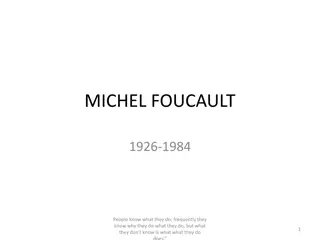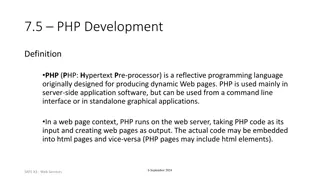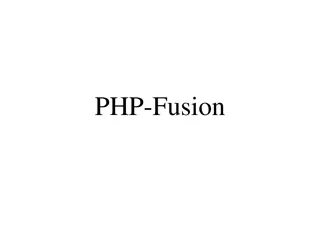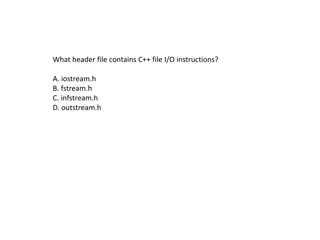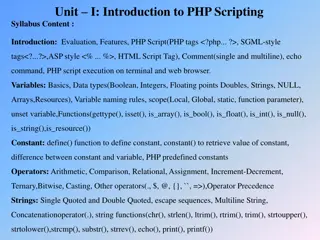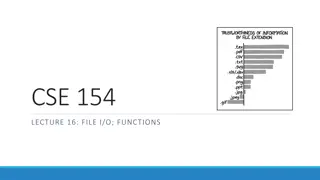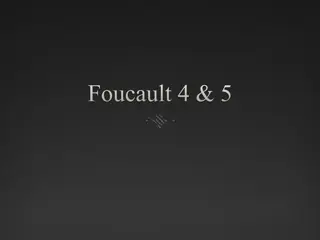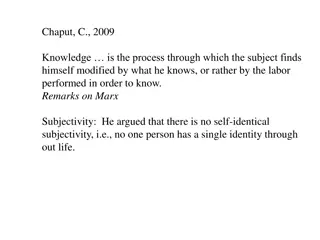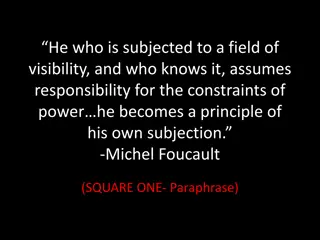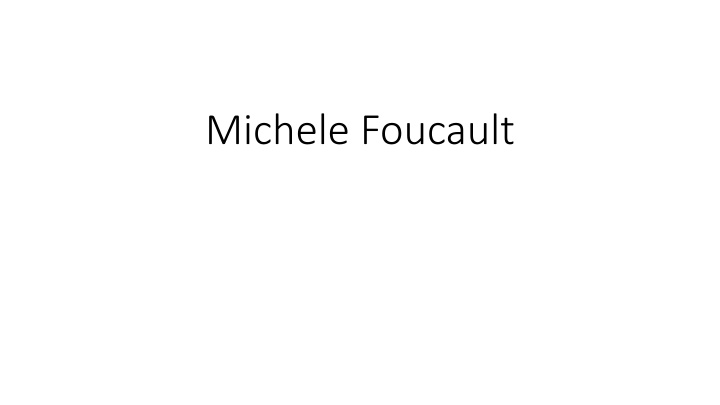
Michele Foucault: Psychology, Philosophy, and Critical Analysis in Medicine
Explore Michele Foucault's works in psychology and philosophy, where he challenges traditional approaches and reevaluates the relationship between normalcy and pathology. Delve into his critical assessments of psychiatry and medicine, focusing on the significance of madness and the emergence of medical rationality. Discover Foucault's unique method of critical history and archeology as he analyzes the conditions for the existence of human cultural phenomena.
Download Presentation

Please find below an Image/Link to download the presentation.
The content on the website is provided AS IS for your information and personal use only. It may not be sold, licensed, or shared on other websites without obtaining consent from the author. If you encounter any issues during the download, it is possible that the publisher has removed the file from their server.
You are allowed to download the files provided on this website for personal or commercial use, subject to the condition that they are used lawfully. All files are the property of their respective owners.
The content on the website is provided AS IS for your information and personal use only. It may not be sold, licensed, or shared on other websites without obtaining consent from the author.
E N D
Presentation Transcript
Michele Foucault Psychology and Philosophy Work and theoretical experience in psychopathology; In philosophy: an attempt to revise Hegel s approach; Critically assesses approaches in psychiatry (Z. Freud), and medicine ( influence of L. Binswanger); This is a question of the relationship between the normal and the pathological; the question of whether the idea of the "norm" of a person can be established on the basis of the analysis of the "pathological". He criticizes psychoanalysis for this: Psychoanalysis found possible to elaborate the psychology of the child, dealing with the pathology of an adult.
Michele Foucault compares this course of psychology with one of the episodes of the formation of medicine at the turn of the XVIII and XIX centuries. This refers to the emergence of pathological anatomy and the role that death acquired for medicine at this moment: "The darkness of life dissipates in the light of death." Madness and Foolishness: The History of Madness in the Classical Era , shows the extent to which our judgment about pathology depends on the notion of pathological, which we follow;
Michele Foucault an attempt to comprehend a special form of rationality - medical rationality, without an existentialist approach; Genuine madness, bearing an important conjectures for enlightening human nature and culture: it will be necessary one day to try to do an analysis of madness as a global structure; madness liberated and restored in rights; madness returned in some way to its original language
Michele Foucault Foucault restricts the analyzed material to a specific historical period (in this case, the XVIII - early XIX century) and relies on a certain corpus of texts (statements of contemporaries about the state of scientific knowledge and the practice arising from it), indicating that since a certain historical era sees one without noticing the other at all, this indicates a special form of rationality inherent only in it. For the existential analysis, the expression becomes the central point because it may be that the dream is seen as a manifestation of the soul in its intrinsic internal , as an anthropological experience of transcendence . New type of anthropology.
Michele Foucault critical method , or critical history , or - in one word - archeology , referring to analyzing conditions for possibility of the emergence and existence of a particular phenomenon of human culture. Words and Things (1960); Culture: language, transgression act , and sexuality. Sexuality is oppressed and denaturalized ;
Michele Foucault Foucault believes, it will be generally understood and reconstructed in terms of power relations and knowledge relations. This leads, according to Foucault, to the formation of the main characters of modern society: a hysterical woman, an adult pervert, etc. The era of Antiquity inspires him a certain amount of hope, putting, in his opinion, the emphasis not on sexuality, but on erotica.
Michele Foucault The theme of sexuality in Foucault, therefore, is closely associated with the theme of power. Here we are dealing with a more general problem, says Foucault in an interview with the West and the Truth of Sex November 5, 1976, a problem that should be considered as a counterpoint to this history of sexuality, is a problem of power. Speaking of power, we spontaneously imagine it as a law and prohibition, as a ban on suppression, and turn out to be very unarmed when it comes to tracing it in its positive mechanisms and effects. A certain legal model dominates the analysis of power, giving absolute privilege to the form of law. It would be necessary to write a history of sexuality that would not be ordered by the idea of power-submission, power-censorship, but by the idea of power- motivation, power-knowledge, you should try to identify a regime of coercion, pleasure that would not be prohibitive, but constitutive for such a complex area, which is sexuality. "
Michele Foucault The distinction between the two forms of power: the one that is mainly connected with the state, and the one that - being located on a different level and representing a special kind of network of power relations that realize themselves through the most different channels - is relatively independent of state power. This is the level of analysis that will later be called the microphysics of power;
Michele Foucault In the works Disciplinary Institutions (1975), devoted to history of prison formation and examining the functioning of power relations not only within the penitentiary system, but also beyond its borders, Foucault contrasts the classical notion of power (presence of a ruling and subordinate; negative character - submission, prohibition, coercion; state privilege) "genealogy of power" He describes modern power - hidden, scattered and even contradictory, which is realized inseparably with knowledge, organizes social space according to the principle of all-supervision , in which each individual is potentially and really under observation and therefore must constantly monitor himself (social optics ) . Thus, the authority disciplines and normalizes individual human behavior (social physics and physiology ), imposing norms of behavior that are mandatory for all members of society ( disciplinary society ).
Michele Foucault Foucault emphasizes that the individual is not something independent, but is formed by the power in order to study and control him. Power thus creates the knower , ways of knowing and the knowable itself. According to Foucault, it is necessary to agree that power and knowledge directly permeate each other; The discipline techniques (and especially the supervision technique) in any public institution of this epoch be it a prison or a factory are not structurally different from each other. But despite the fact that power is exercised in the whole space of society, in any institution, its ideal space, according to Foucault, remains primarily a prison
Michele Foucault characteristic of the social systems of the modern era. It originated in the Western world in the XVIII XVIII centuries, in the process of modernization of old European societies. Disciplinary society is the currently dominant form of social organization, The emergence of disciplinary societies was primarily due to the need to manage a multitude of individuals in order to adapt them to the functional requirements of the industrial capitalist and administrative- bureaucratic orders of modern societies.


